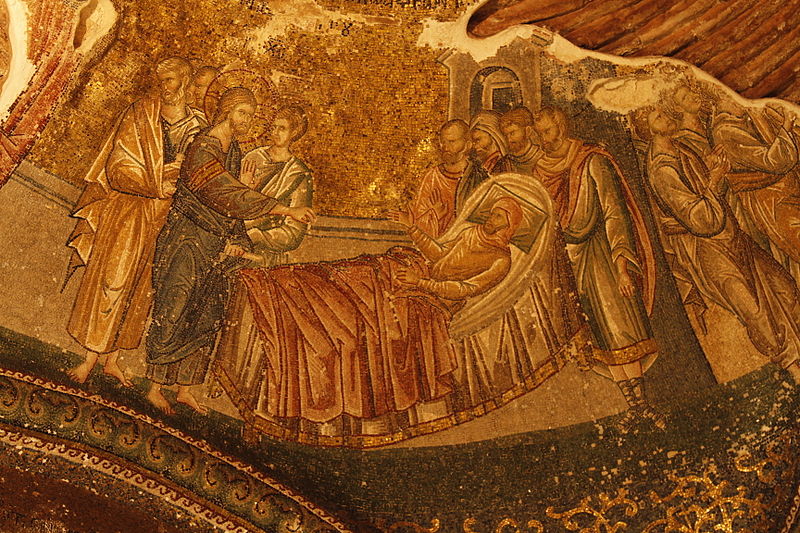On leaving the synagogue
Jesus entered the house of Simon and Andrew with James and John.
Simon's mother-in-law lay sick with a fever.
They immediately told him about her.
He approached, grasped her hand, and helped her up.
Then the fever left her and she waited on them.
When it was evening, after sunset,
they brought to him all who were ill or possessed by demons.
The whole town was gathered at the door.
He cured many who were sick with various diseases,
and he drove out many demons,
not permitting them to speak because they knew him.
Rising very early before dawn, he left
and went off to a deserted place, where he prayed.
Simon and those who were with him pursued him
and on finding him said, "Everyone is looking for you."
He told them, "Let us go on to the nearby villages
that I may preach there also.
For this purpose have I come."
So he went into their synagogues,
preaching and driving out demons throughout the whole of Galilee.
What jumps up at Christian Scientists about this Sunday’s reading is that Jesus had the power to heal, and healing illness was a major part of his activity. What jumps out at me in the reading is that there were clearly a lot of people possessed by demons in First Century Judea. About as many, it sounds like, as people with physical illnesses, at a time when physical illnesses must have been more common than today.
So why do we not have many people possessed by demons today? What happened between then and now? Or do we?
After all, demons are real. That is non-negotiable for a Catholic. All things, visible and invisible, seen and unseen. Logically, then, demonic possession is also real, and the Church retains rites to deal with it. So, not incidentally, do the Orthodox Churches, Islam, and virtually all other religions. Can they all be wrong?
The obvious conclusion, and the one I make, is that what was then called demonic possession we now call “mental illness.” Freud even used the terminology: he speaks of “obsession.” “Obsession” originally meant “hostile action by an evil spirit,” one notch down from possession. What could be clearer? And this, of course, is why we, as if instinctively, fear the “mentally ill.”
A “schizophrenic” of my acquaintance keeps hearing metallic voices telling him to go jump off the balcony. Occam's razor: the simple and obvious explanation is that he is being tempted by an evil spirit. Anything else requires a good deal of mental gymnastics.
Another, to use the classic example, thinks he is Napoleon? The simple explanation is that he is possessed by the spirit of Napoleon, or of an evil spirit masquerading as the French Emperor.
So too with anxiety and depression. 1 Samuel 16:4: 14 “Now the spirit of the LORD had departed from Saul, and an evil spirit from the LORD terrified him.”
Given that “mental illness” is necessarily, by definition, mental or spiritual in nature, it seems only sensible and efficient to address it in mental or spiritual terms. In other words, if a person thinks he is being invested with an evil spirit, he is being invested by an evil spirit, because in this case the thought is the thing itself. And the most efficient cure is something that will drive out the thought of the evil spirit. If the thought is gone, the thing is gone.
How? How do you change hearts and minds?
Two ways: art and prayer.
Shamanic cultures use what seems to us very much like drama: a story which can engage the mind and concentration, Coleridge’s “willing suspension of disbelief,” and which then catches up and drives out, as Aristotle explained (it is the meaning of his term “cartharsis”), the evil spirits. This is how Korean mudangs, female exorcists, work, or the Native American “False Face Societies.” Other arts can also do this, in their various ways. David's harpistry drove the evil spirits from King Saul: “seek out a man who is a skilful player on the harp; and it shall be, when the evil spirit from God cometh upon thee, that he shall play with his hand, and thou shalt be well.”
Myths, two, are probably designed to do this. “Myth” literally simply means “story.” Make it a real stemwinder, and it should have the engaging power to chase off the plague dogs.
If so, it is a serious misunderstanding to suppose a myth is a serious, but mistaken, statement of “scientific” cosmology—that it is meant to be taken seriously as the scientific explanation of how the leopard got his spots. It is real and true to the extent that it is engaging and vivid. This is why, for example, the Greeks, the Egyptians, or the Indians, could happily accept several contradictory myths in this scientific sense: several different origins for the sun, for example, or for mankind. Not a problem.
This is not science, but spiritual technology. Myths make the world meaningful and significant, and so fend off the demons. Or, should a demon come, immersion in a suitable myth can heal.
Now, what happens when the old stories, or the art, breaks down? That is, either it is forgotten by a large portion of the people, or it loses its power to enthral, to suspend disbelief?
All hell should theoretically break loose. There should be a general sense of meaningless and barrenness to the world; what was once a garden of shining meanings becomes a desert or a wilderness. And then the demons, who dwell in the wild places, like Lilith, or Pan, or the djinn, will come.
And they do. The classic case where this can be expected to happen is during rapid cultural change; when, for example, a culture long isolated encounters a new culture suddenly and massively.
Think, for example, of the North American Indians: as is generally understood, as soon as the Spanish arrived on their shores, they started dying off in droves. The usual explanation is the contact with unknown diseases, and that is fair enough, but it does not fully explain the matter. For one thing, logically, that spread of diseases ought to have gone about equally both ways, so the Europeans should also have started dying off. There is, indeed, evidence that syphilis came to the old world from the New; but it hardly had the effect on Europe the Indians experienced. For another, it does not explain how the early Conquistadors, with only a handful of men, were able to conquer vast Empires, the Incans and the Aztecs, with little effort.
Darwin spends some time in “The Descent of Man” documenting many similar examples from around the world, from the many new contacts of the European age of exploration and colonization. He does not see the effects of new viruses so much as the sudden loss of fertility: people in these societies stop having, and caring for, children.
Why?
Not because they are ill, but because they are dispirited. As we see in microcosm whenever an individual has a case of culture shock, the encounter with a new culture throws all the old stories into question, all the meanings the human world has acquired for that individual or culture. The individuals in the culture become depressed, unable to go on because unable to see any point in their existence. In time, they may well also become possessed--mad.
Why did the same thing not happen to the Europeans? Because they were inoculated by already, rather recently, having had contact with other alien cultures. Notably, the Spanish only finally drove the Muslims out of Spain in the same year Columbus sailed. More notably, they had long ago been inoculated by a mythos developed during the Alexandrian and Roman Empires, with their mixing of peoples.
I suspect, indeed, that a milder version of this sort of cultural collapse with the loss of the old stories was the general condition in Palestine and in the Roman Empire at the time of Christ. The conquests of Alexander, followed quickly by the conquests of Rome, suddenly brought a wide variety of cultures into direct contact, Persians, Semites, Greeks, Egyptians, Celts, destroying the common heritage of the shared stories and psychic dramas that Homer, for example, would have known. As a result, the gods were no longer taken very seriously. And as a result, a sense of meaningless and then an epidemic of demonic possession should be expected to be extremely common at that time. And it was—we can trace the sense of meaninglessness, the general depression, in the writings of what is sometimes called the “Axial age.” circa 500 BC.
Ecclesiastes is the perfect expression of depression. Buddhism, Pythagoreanism, the Tao Te Ching, and the Upanishads are of the same time, and of the same genre.
Then, we seem to see, in the New Testament, the upwelling of demonic possessions—of that madness beyond depression and anxiety.
This explains, in turn, how Christianity spread so quickly through the Empire: its ability to cast out demons. This is in fact what the ancient historians tell us: that first the Jews, and then the Christians, developed a huge prestige throughout the empire specifically for their ability to cast out demons. The powerful impression of its spiritual coherence, its spiritual truth, its vivid and compelling narrative, was strong enough to restore the shattered spiritual order. Later, it was strong enough to give Europe the upper hand in encountering alien cultures world-wide. Later still, its ability to drive out the demons and restore psychic order has led to its rapid adoption throughout the Third World: in the Americas, Africa, and now China.
Unfortunately, in the more developed parts of the world, we have recently seen another shattering: the one reported by Eliot in The Waste Land, or Yeats in The Second Coming. Things have again fallen apart, over the past century or so; again the spiritual centre cannot hold. Again what we see around us is no longer the shimmering garden of meaning, but a desert, the desert too of “Waiting for Godot.” Art has become derelict and morbid, and the incidence of mental illness seems, by many accounts, to be skyrocketing.
We are all going mad. We are all becoming possessed by demons. There is a spiritual catastrophe taking place.
This, I believe, is not because of globalization. That has been a relative constant for five hundred years. It is because our fascination with the material successes of science and scientific technology has caused us to neglect and to abandon our spiritual technology. We are no longer teaching our children the stories. We are no longer enthralled by the mystery of the Mass. We no longer believe in anything in particular.
As a result, we have stopped having children, or caring for them.
We are letting the demons in.
































